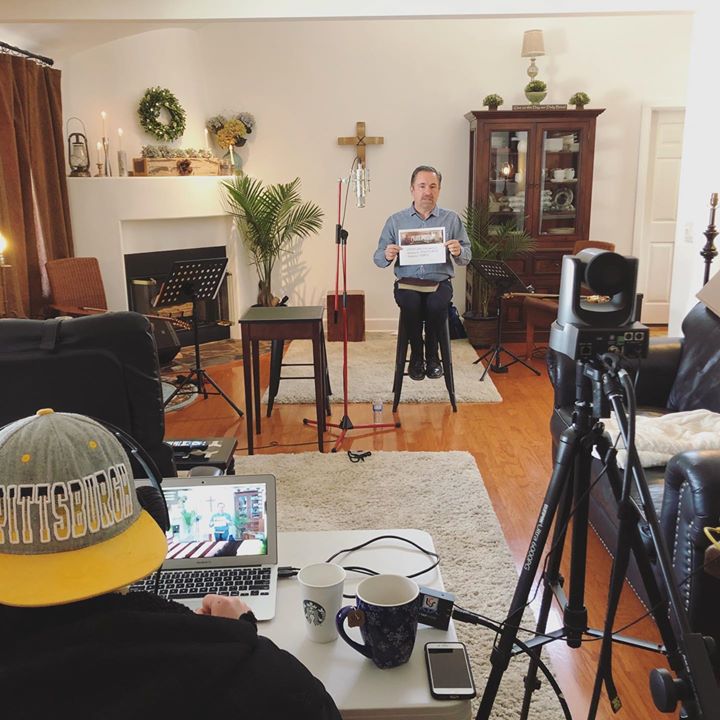Holy Week, Passover Offer Connection Amidst COVID-19 Social-Distancing
April 8, 2020
For the first time in thousands of years, celebrations of Holy Week, leading up to Easter and Passover will not involve traditional in-person gatherings, but for places of worship, social distancing offers an opportunity to find creative ways to connect.
“We have a digital presence prior to pandemic, but in these days [Pastor] Hazel and I realize that this is a way to continue to shape communities of faith in a way that is not attached to a building,” California Lutheran University Pastor Scott Maxwell-Doherty said. “Currently, college students perceive it’s not about a building it’s about a cluster of individuals that I share my concerns and my hopes and joys with.”
Though students are typically off campus for spring break during Holy Week, Campus Ministry at Cal Lutheran will continue to host Common Ground on Wednesday as well as weekly chapel service, Thursday from 11:15 a.m. to 12:25 p.m. on Zoom.
Churches such as the Conejo Valley Church of Christ, Anthem Church, and Conejo Church are offering either live or prerecorded videos for their congregations, as their physical places of worship remain closed.
Others, including Emmanuel Presbyterian Church and Holy Trinity Lutheran Church are sharing scripture, prayer and reflection for congregation members over email.
On campus spiritual clubs such as Delight Ministry and Young Life Cal Lutheran will continue to host their regular meetings on Zoom throughout Holy Week, offering an additional opportunity for students to connect and share in ministry.
Though worship leaders have found new means of virtual connection, the COVID-19 pandemic has presented disruption in the traditional celebration of Easter and Passover.
“Easter is kind of like the Super Bowl for most churches–it’s a packed house, it’s more family friendly, there is lots of music,” Lead Pastor Kirk Dewitt of Conejo Church said. “This is maybe the first time in history Christians didn’t gather in big groups for Easter… in 2,000 years.”
Rabbi Chaim Bryski of the Thousand Oaks Chabad Jewish Center said similarly, the celebration of Seder, a feast that marks the beginning of Passover is usually celebrated in large gatherings of family and friends, but this year it will be different.
“Here at Chabad we are very much in tune with opening our doors for Jewish [people] who may not experience a traditional Seder,” Bryski said. “It’s been 20 years since I’ve been here, I’ve celebrated that way, I’ve never had it with family.”
For both the Jewish and Christian traditions, Easter and Passover will take on new meaning this year, centered around the individuals that people of faith are sheltering-in-place with.
“The tradeoff is people won’t be going out to brunch, I think many will tune in [to worship] and do something as a family that’s meaningful,” Dewitt said.
Dewitt added that especially during the pandemic he has seen both Christians and non-Christians really lean into their faith, using their Facebook live statistics as an example. “There’s normally about 100 [congregation members] in the room, but five times as many people have attended online, during the last service, 1,300 people watched,” Dewitt said.
In order to connect the Jewish community during Passover, the Chabad of Thousand Oaks is offering online classes on how to conduct a Passover Seder in one’s own home, whether that be with loved ones or in isolation alone.
Similarly, Conejo Church is providing a Good Friday “at home edition,” which leads people through five stations beginning with communion, going on to find a nail, through their garden and ending with blowing out a candle–symbolic of Jesus’ death.
In addition to providing family activities, local churches and synagogues will continue to share worship videos and offer opportunities for dialogue throughout Holy Week and Passover.
Maxwell-Doherty and Bryski said that both the Lenten Season leading to Easter and Passover are times for introspection and spiritual closeness. Both say the pandemic has granted an exceptional opportunity for this.
“In general I think a majority of people live with the notion they are in control of a lot of things. This particular season of lent, with a whole range of things that have gone on personally and at Cal Lutheran, make one quickly realize how much you really don’t have control of,” Maxwell-Doherty said.
One thing various religious communities do have control of during this unprecedented time, is their ability to take the time to use these holidays and celebrations as a time to heal and rebuild both spiritually and as individuals.
“The original passover was the same day, it was a Wednesday night, the fourteenth day of Nissan, the moon was full, and you’ll see Wednesday–there is a full moon,” Bryski said. “Every Jew[ish person] had to stay home because a plague was raging outside, you have to stay home with family, but you’re all together separately. There’s a very powerful thing that is happening again and I hope just like then it comes with great results: a new consciousness, a new era of brotherhood, and a new era of caring.”
Maxwell-Doherty agreed, that there is no “going back” to what was once deemed normal, but there is an opportunity to learn how to truly connect, through distance.
“It’s a merit to the world, showing such kindness that today, we all do this to preserve the lives of elderly and vulnerable with underlying conditions, that’s who we’re protecting,” Bryski said. “God is going to see that merit and bring many miracles and great blessings.”




















